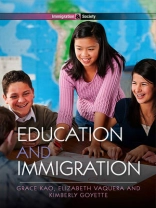Education is a crucially important social institution, closely
correlated with wealth, occupational prestige, psychological
well-being, and health outcomes. Moreover, for children of
immigrants – who account for almost one in four school-aged
children in the U.S. – it is the primary means through which
they become incorporated into American society.
This insightful new book explores the educational outcomes of
post-1965 immigrants and their children. Tracing the historical
context and key contemporary scholarship on immigration, the
authors examine issues such as structural versus cultural theories
of education stratification, the overlap of immigrant status with
race and ethnicity, and the role of language in educational
outcomes. Throughout, the authors pay attention to the great
diversity among immigrants: some arrive with Ph Ds to work as
research professors, while others arrive with a primary school
education and no English skills to work as migrant laborers. As
immigrants come from an ever-increasing array of races,
ethnicities, and national origins, immigrant assimilation is more
complex than ever before, and education is central to their
adaptation to American society.
Shedding light on often misunderstood topics, this book will be
invaluable for advanced undergraduate and beginning graduate-level
courses in sociology of education, immigration, and race and
ethnicity.
Зміст
1 Education and the American Dream 1
2 Becoming American (or Not): Paths to Assimilation 25
3 Historical Overview of Immigration 51
4 Educational Attainment and Socioeconomic Status of Immigrant Adults 76
5 Educational Achievement and Outcomes of Children in Immigrant Families 106
6 Language and Educational Success 140
7 Conclusion 170
References 189
Index 210
Про автора
Grace Kao is professor of sociology, education, and Asian American studies at the University of Pennsylvania
Elizabeth Vaquera is assistant professor of sociology at the University of South Florida
Kimberly Goyette is associate professor of sociology at Temple University












